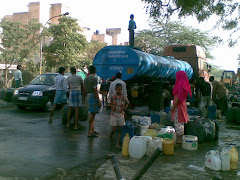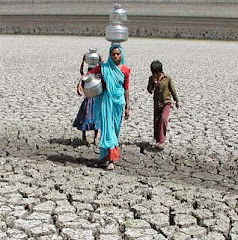The Indian Government has finally decided to hold an annual jamboree around water. Beginning this year, the India Water Week proposes to be India's showcase event to the global water community -- exhibiting India's latest technology; project capabilities on the consultancy front; construction and manufacturing prowess et al.
Also on the agenda during the Week would be a platform for exchange of ideas on policy and technology in the water sector, which is now being recognised to be critical to India's continuing economic and social growth.
The theme for the first Week is apt - “Water, Energy and Food Security call for Solution”. Policy intervention as well as increased investment is the need of the hour in all the three component sectors of the theme.
It is time that India held such a show. The highly successful Singapore International Water Week and the Stockholm Water Week are two such events that the host Governments have been promoting for several years now. And, both events have constantly brought global experts, professionals, policymakers, ministers and top government officials and honchos from the private sector together at a single platform.
Hopefully, India Water Week will become one such mega event that the global water community will find difficult to miss. Much would, however, depend on how the event unfolds and what the "take-aways" are.
India Water Week (IWW - 2012) will be held at Vigyan Bhawan, New Delhi during April 10–14.
Saturday, April 7, 2012
Sunday, December 11, 2011
Delhi opens doors for private players in water sector
The Delhi Government has initiated much-awaited reforms in water sector by opening doors for private entities in management, maintenance and distribution of water in several areas of the city.
A board meeting of the Delhi Jal Board (DJB) on November 28, which was chaired by Chief Minister Sheila Dikshit, approved a long-pending proposal to involve private sector in three pilot projects in the command areas of Malviya Nagar, Vasant Vihar and Nangloi underground reservoirs and water treatment plants.
The move, which has been expected to several months, comes in the wake of the successful privatisation of power distribution in the city-state.
The Delhi Government has finally bit the bullet, even though there has been much opposition to its move to privatise power distribution. And, over the past few since private distcoms started distributing power, it cannot be conclusively said, as yet, that the move has been for the better.
But, in the case of water, some operations, including supply of water in underfed areas through roping in private tanker suppliers, have had mixed results.
Delhi would now join a growing list of cities across India, in which water distribution, billing and management of non-revenue water (NRW) is being handed over to the private sector while local water utilities or municipal bodies retain the power to increase water charges with them.
Also, since infrastructure assets would remain with the Government, it would be worthwhile to watch how privatisation helps in getting water to the thirsty in the national Capital.
A board meeting of the Delhi Jal Board (DJB) on November 28, which was chaired by Chief Minister Sheila Dikshit, approved a long-pending proposal to involve private sector in three pilot projects in the command areas of Malviya Nagar, Vasant Vihar and Nangloi underground reservoirs and water treatment plants.
The move, which has been expected to several months, comes in the wake of the successful privatisation of power distribution in the city-state.
The Delhi Government has finally bit the bullet, even though there has been much opposition to its move to privatise power distribution. And, over the past few since private distcoms started distributing power, it cannot be conclusively said, as yet, that the move has been for the better.
But, in the case of water, some operations, including supply of water in underfed areas through roping in private tanker suppliers, have had mixed results.
Delhi would now join a growing list of cities across India, in which water distribution, billing and management of non-revenue water (NRW) is being handed over to the private sector while local water utilities or municipal bodies retain the power to increase water charges with them.
Also, since infrastructure assets would remain with the Government, it would be worthwhile to watch how privatisation helps in getting water to the thirsty in the national Capital.
Subscribe to:
Comments (Atom)

.jpg)


